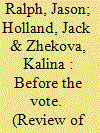| Srl | Item |
| 1 |
ID:
157608


|
|
|
|
|
| Summary/Abstract |
The literature of recent UK policy toward Syria focuses on the 2013 chemical weapons crisis. We examine policy discourses leading up to that. The government supported the removal of Assad but faced the challenge of explaining how that would be realised. Given its unwillingness and inability to mobilise support for military intervention, or to tailor policy goals to match available means, government strategy arguably lacked credibility. Our purpose is to examine how the government tried to close this ends means gap and how, having failed to do that, its ‘discursive strategy’ legitimised its approach. We argue the resources for the government’s discursive strategy on Syria can be found in the earlier articulation of ‘liberal conservatism’. A policy that from an ideal-liberal or ideal-conservative position might have been criticised as half-baked was maintained by a strategy that gave consideration to, but did not completely follow through on, either archetype. Drawing on an analysis of 2,152 sources and supplemented by elite interviews, we illustrate how this strategy managed the interplay of two basic discourses: a liberal insistence that the UK should support ‘the Arab Spring’ and a conservative insistence that military intervention was imprudent because ‘Syria was not Libya’.
|
|
|
|
|
|
|
|
|
|
|
|
|
|
|
|
| 2 |
ID:
191771


|
|
|
|
|
| Summary/Abstract |
The study challenges the conventional wisdom that Russia’s approach to state sovereignty is inconsistent and contradictory. It closely examines official statements alongside debates on the 2014 Ukraine crisis in the Russian State Duma, tracing the way two seemingly divergent notions—sovereignty as non-interference and sovereignty as responsibility towards a broader ethnic/civic community—are constituted in Russia’s wider political elite discourse. It argues that there is more commonality than divergence between the two main discursive positions as both are made possible by radical anti-Westernism, which was remarkably consistent throughout the different stages of the 2014 Ukraine conflict.
|
|
|
|
|
|
|
|
|
|
|
|
|
|
|
|